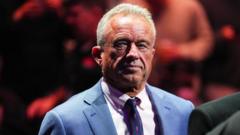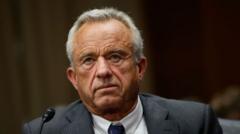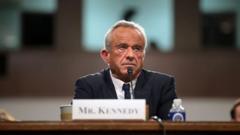The former environmental attorney has garnered both praise and skepticism as he plans to challenge the status quo in the food industry.
**Can RFK Jr. Revolutionize America's Food System?**

**Can RFK Jr. Revolutionize America's Food System?**
RFK Jr. aims to transform the American diet by addressing ultra-processed foods and food safety regulations.
Robert F. Kennedy Jr. is stepping into the spotlight with ambitious goals aimed at transforming the American food landscape. Recently nominated as President-elect Donald Trump's choice to lead the Department of Health and Human Services (DHHS), Kennedy has long critiqued what he calls the negative impact of ultra-processed foods and harmful additives on public health.
Kennedy's mission, encapsulated in his campaign slogan "Make America Healthy Again," seeks to eliminate unhealthy food products that dominate American diets. From the artificial dyes used in popular cereals to dangerous seed oils in fast food, he highlights how these ingredients jeopardize children's health. At a rally in November, after he concluded his independent presidential run, he expressed, "We are betraying our children by letting [food] industries poison them.”
Despite some enthusiasm from health advocates and lawmakers, Kennedy's appointment has sparked considerable debate. Critics, including former New York University nutrition professor Marion Nestle, suggest that Kennedy's approach to tackling Big Food might be more complex than he acknowledges, particularly considering his history of making controversial claims about health issues.
One of Kennedy's notable plans involves reshaping the Food and Drug Administration (FDA), which oversees food safety regulations in the U.S., through aggressive reforms. He has expressed intent to fire employees he believes contribute to a corrupt system and eliminate departments failing to protect public health. This has raised eyebrows, as many believe that such drastic measures could complicate the FDA's critical role in safeguarding the food supply.
Notably, Kennedy has targeted school lunches, labeling the current offerings as a "toxic soup" and advocating for a ban on ultra-processed foods in cafeterias. His supporters see merit in his views on chronic diseases linked to nutritional choices, while some public health experts warn that some of his positions—such as his stance on raw milk and fluoride—lack scientific backing.
Despite the challenges ahead, some experts believe that Kennedy could initiate significant changes within existing regulatory frameworks. For instance, updating U.S. Dietary Guidelines could effectively impact industry practices. However, any meaningful change will necessitate navigating the interests of the food industry, where Kennedy's proposals may encounter considerable resistance.
Overall, while RFK Jr.'s intention to promote healthier eating habits represents a positive step toward public health reform, achieving substantial change will depend on collaboration with established food regulatory systems, expert advice, and overcoming the formidable influence of the food industry.


















